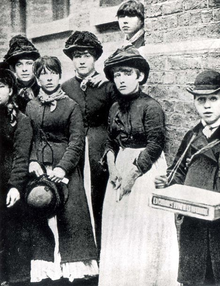
In July 1888 the women and teenage girls working at the Bryant & May match factory in Bow, London, England went on strike. At first, the strikers were protesting the dismissal of a worker after employees had refused a demand from Bryant & May management to repudiate an article on terrible working conditions at the factory. When management promised to rehire the fired worker, the strikers continued the industrial action to bargain for a cessation of unfair deductions from pay and for other improvements to working conditions. With the help of social activist Annie Besant, they succeeded.
Following the strike's success, the Union of Women Matchmakers (later the Matchmakers' Union) was formed later in 1888. On its creation, it was the largest union of women and girls in the country, and inspired a wave of collective organising among industrial workers.